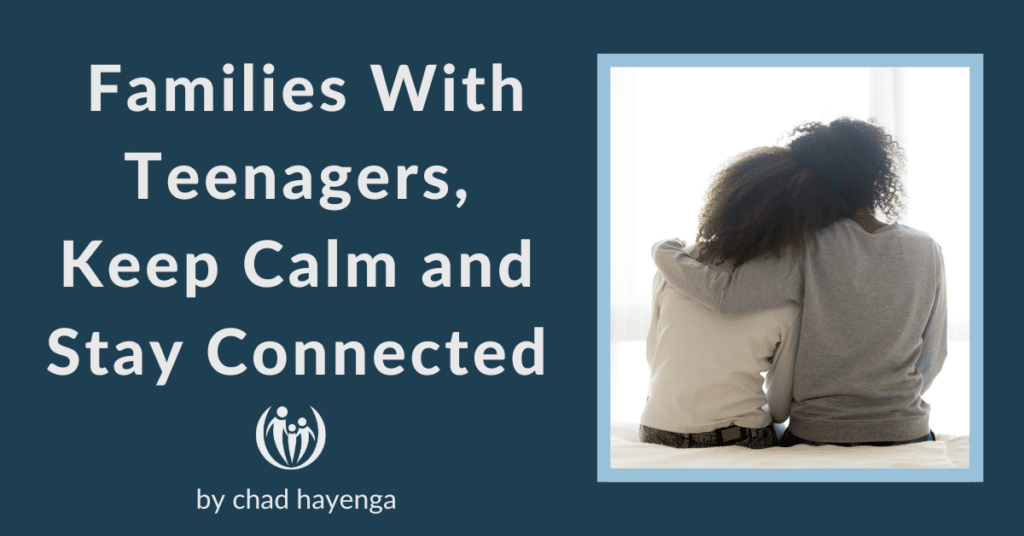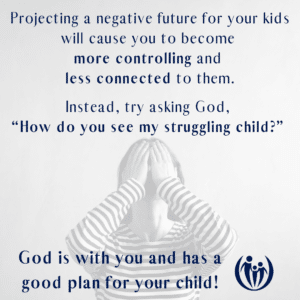
Families With Teenagers, Keep Calm and Stay Connected

Families with teenagers have joys and challenges that are different from families with littles. Just when you think you’ve got this parenting thing down…things can change again.
But why do the teenage years get such a bad rap? There are some built-in family stressors in the teenage years, even so, they can also be wonderful. As kids get older, parents and teens often begin to have opposing goals. This may create varied degrees of conflict. Teens long for independence. That’s a natural and healthy milestone. Kids are working to become independent from their parents. The thing is, parents are still working at setting up needed boundaries because these teens are still needing guidance. This can create tension and often a push-back on values.
Then what happens? Some of your child’s pushback may seem like a slippery slope away from your most deeply held beliefs. If that’s the case, anxiety is a typical (though not particularly helpful) parental response. It’s challenging to keep calm and stay connected!
As a parent coach for many years, I have seen and heard from many parents. It is not uncommon for me to provide coaching to parents of teens who are struggling with things like drug use, identity and body image issues, disrespect, and lying.
What often happens in families with teenagers
If you’re feeling anxious about your teen (or tween) child, there’s something you need to know. It’s normal for worried parents to react in largely unhelpful ways. Why? Because anxiety leads to quick reactions instead of thoughtful responses when you feel your child pulling away.
Parents tend to get more restrictive with a focus on changing their child’s behavior. Your child was already trying to pull away and assert their independence before. Now what do you think will happen?
Restrictions and consequences may be needed, but if we start there, we risk losing the relationship while demanding right behaviors. Then, at the end of the day, we have neither a good relationship nor a “well-behaved” kid.
If you see the potential for this dynamic in your family, here are some helpful things to keep in mind.
Check your parenting foundation: Start by digging under the surface
Ask yourself the following questions:
- What do I believe about my struggling teen?
- How does that belief impact our relationship?
- What’s a “grace-and-truth-filled” perspective of my child?
- How am I talking about my child? Am I making inside jokes (to myself or out loud) about my child doing jail time, or living in our basement for 20 more years, etc.?
- Am I simply focused on my child’s failures?
Allowing a fresh perspective to influence your thinking can keep you from projecting a negative future for your kids.

Projecting a negative future can cause you to become more controlling and less connected to your child. To counteract this tendency, with my own teens, I would ask the Lord, “How do You see my struggling child?” This helped me get into a better frame of mind since I never got the sense that God was throwing up His hands in despair!
Anchor in the truth: God is with you and has a good plan for your teen. Philippians 1:6
Determine to keep calm and stay connected
Your teen needs more connection right now, not less. And yes, it can be challenging to connect with a child who continues to push you away and is making choices with which you disagree. Remember that sometimes, it’s a child’s own sense of guilt or shame that makes it difficult for them to connect with you.
Practically speaking, what does crossing the connection gap look like?
- First: Pray and ask God for insight into how you might best connect with your child.
- Send a text message or email affirming something about them.
- Leave a sticky note on their desk or bathroom mirror with a grace-filled truth.
- Take a calming breath and look at them with a pleasant look on your face!
- Bring home their favorite treat.
- Play/do something together that your teen is better at than you, and laugh at yourself as you encourage them – whether it’s video games, a card game, a sport, etc.
- Watch some old home videos together or look at a photo album from when they were younger.
- Tell them you were thinking about something they did that made you smile.
Persevere knowing that it’s never too late, even for families with teenagers or adult children
As your kids get older, it’s tempting to think, “It’s too late. I wasn’t good at connecting when they were little, and I’m not good at it now. They just don’t want to be around me.” At Connected Families, we believe it’s never too late to develop a connected relationship with your children (and even your parents!). There are many things to love about your kids!
Indeed, it’s never too late. The older your kids are when you make parenting changes, the more they are able to notice your effort to keep calm and stay connected and remember it! We challenge you to have a NEW vision for your family – one filled with hope and promise rather than despair as you learn to lead your family (and teens!) with grace.
What are your parenting strengths?
You’ve got them. Knowing your strengths will help you become the best parent you can be. Knowing your parenting challenges is useful information too. Take our FREE ASSESSMENT.






